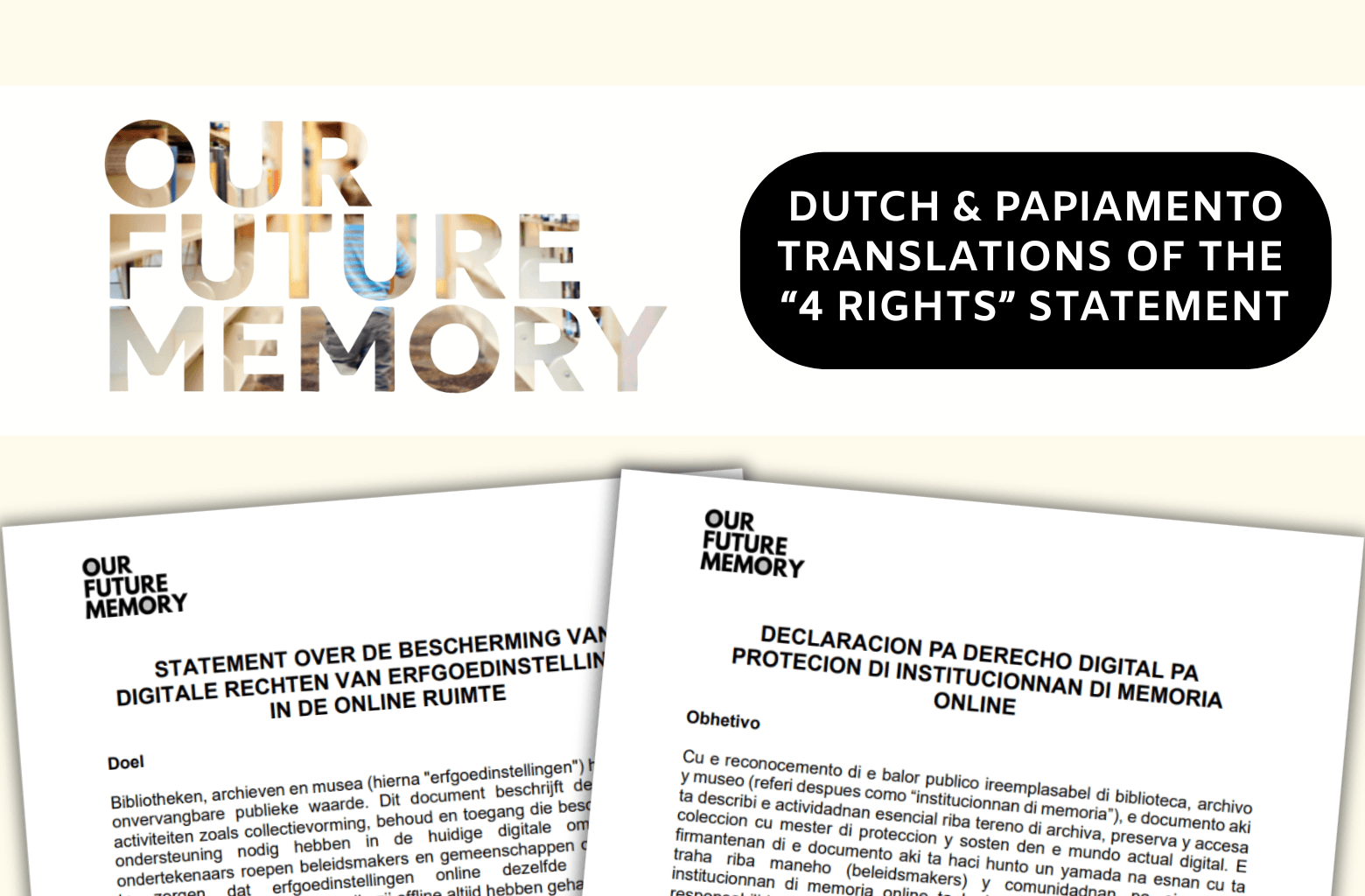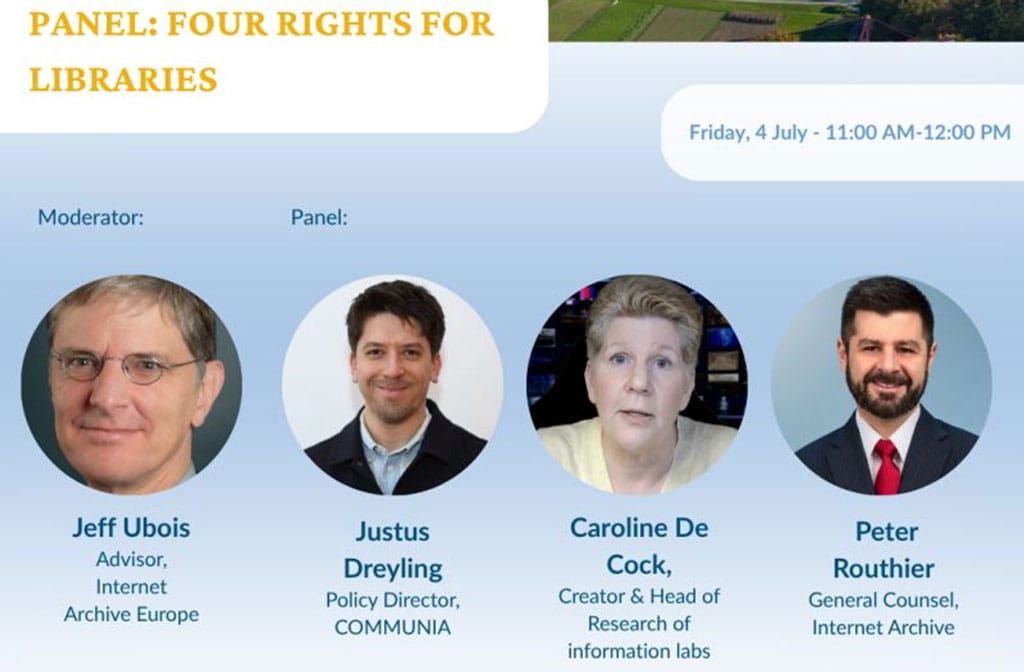We’re pleased to announce that the Our Future Memory “4 Rights” statement has now been translated into Dutch and Papiamento, thanks to the generous work of Biblioteca Nacional Aruba and Maarten Zeinstra from IP Squared.
This is a wonderful moment of collaboration, and we extend our deepest gratitude to our partners for helping to spread this vital message. These translations enable the statement to reach more institutions, stakeholders, and decision-makers in Dutch- and Papiamento-speaking communities. You can read the newly translated versions and sign the statement at ourfuturememory.org.
Internet Archive Europe is now also a signatory to the “4 Rights” statement. “By endorsing the 4 Rights, we’re reaffirming that universal access to knowledge isn’t a slogan—it’s a shared responsibility. Achieving it requires clear rights, workable rules, and practical collaboration across borders,” said Tony Guepin, Board Member, Internet Archive Europe.
Voices from Aruba
Peter Scholing, Head of Digital Collections and Research: “In April of 2024, this statement was first signed in Oranjestad, Aruba, by memory institutions from Aruba and the rest of the Kingdom of the Netherlands. By making the Digital Rights Statement available in both Papiamento and Dutch we renew and confirm our commitment to universal access to information, and emphasize that we as memory institutions have an important role to play in this, by actively providing access to the digital and digitized information that is relevant and important to our communities and local audiences. It starts with (re)claiming our digital rights.”
Ichmarah Kock, Digital Collections and Information Management: “Heritage collections in Aruba are often fragile and scattered. When we at Aruba’s National Library digitize these collections, we are reminded that heritage does not belong to a single institution but to the people. The Digital Rights Statement ensures that everyone has the right to access, reuse, and reimagine our heritage without barriers.
Having the statement available in Papiamento is powerful because it shows that our rights to (digital) knowledge and culture are not abstract ideas, but part of our own language and our own way of seeing the world. With the Statement becoming available in Papiamento we also extend an invitation to other ‘lesser-known’ languages. They too deserve space and visibility, whether in physical or digital collections.
In my work, I see how digital collections come alive when the public engages with them. From old newspapers to photographs of daily life, each item we digitize is a piece of who we are. It is important that people can not only find digital information, but also trust that it remains free, open, and safe for future generations. The Digital Rights Statement ensures that these pieces remain accessible and guarantees that people in Aruba are not just users but co-creators of our future collective memory.”
Yorleny Oduber-Quesada, Information Specialist, Special and National Collections: “Papiamento represents both identity and dignity. To safeguard the future of our communities and the wider world, it is imperative that we secure the right to digital information for all people — without barriers of language or geography.” = In Papiamento: “Papiamento ta un idioma di identidad y dignidad. Pa proteha e futuro di nos comunidad y di mundo, nos mester garantisa derecho di acceso na informacion digital pa tur hende, sin limitacion di idioma of luga.”
Why Your Signature Truly Matters
You might think: “My national or regional federation has already signed this via IFLA or another body — do I still need to sign?” The answer is: yes. Here are a few reasons why:
- More signatures = stronger message
When policymakers see a broad base of institutions — not just large federations — endorsing the statement, it sends a powerful signal that these rights matter on the ground, day in and day out. - Local relevance & accountability
Your institution’s signature shows that you, locally, accept these principles and expect them to be respected in your jurisdiction. It’s not just theoretical or distant; it’s part of your institutional agenda. - Amplification and visibility
Every additional signatory spreads awareness in its own network. That raises the chances that local ministries, cultural heritage bodies, funders, and legislators will pay attention. - Diversity strengthens legitimacy
When small, mid-sized, and large institutions from different countries and contexts sign, it demonstrates that the 4 Rights are relevant across many settings—not just for large institutions.
In short, whether your institution is large, small, national, local, specialized, or generalist — your voice adds weight.
- Visit the Our Future Memory website at ourfuturememory.org and go to the “Sign the Statement” page.
- Sign up your institution: Print the statement and sign it by hand or fill it in electronically using an Adobe-compatible tool and email it to campaigns@internetarchive.eu
- Share the announcement via your communication channels: newsletters, social media, partner networks.
Let’s show the world that the future of memory is a cause that unites us all. Stand with us, add your name, and let’s make our call for change impossible to ignore.



